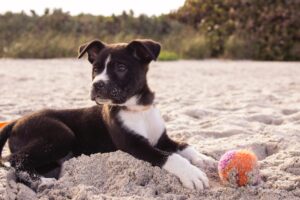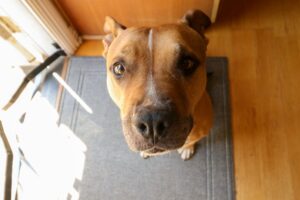Menu
How to Train Pitbull Puppies Not to Bite: A Balanced Approach
It is very important to know how to train pitbull puppies not to bite. You want to raise your pitbull puppy with a lot of leadership as pitbulls grow into very muscular and powerful dogs. Many are quite sweet and docile, but some go through various developmental periods where unwanted behaviors start to emerge. Addressing puppy biting properly and understanding what methods are appropriate for various puppy ages is extremely important for raising and training a pitbull puppy.
All puppies go through a phase where they explore the world with their mouths, leading to sharp puppy teeth finding their way to your hands and feet. It’s crucial to teach them bite inhibition as they grow older into adolescence. In this article I am going to talk about how to best address pitbull puppy biting so that you end up with an awesome adult dog that listens to you.
I will also be addressing how to fix puppy aggression and determining what is aggression verses normal teething. My methods are based in balanced training and positive reinforcement training and I will not be sugarcoating this information. I will be giving you a no-nonsense approach to how to train your pitbull puppies not to bite, so keep reading.
Tips To Stop Biting For Puppies at 2-4 Months Old
Wondering what to do if your 2 month old puppy keeps biting you? It’s totally normal and I will address positive reinforcement and techniques in my other blog on 2 month old puppy biting.
Have your puppy play with other puppies (same age). Puppies teach each other when a bite is too hard by yelping loudly. The biting puppy usually stops, pauses, then gets back to playing but adjusts their bite pressure.
You can also let your puppy bite your hand and yelp loudly if they bite too hard. Like really loud! This helps teach many puppies about bite pressure that is human appropriate. Try this many times over the course of weeks.
Substitute a toy or chew when your puppy is biting your hands – this is redirection.
If petting your puppy leads to playing and biting, pet less, and do more obedience and engagement exercises with food reward.
Keep your puppy on a leash at all times. Keep their day structured so they aren’t running around the house free and attacking your feet. Prevent the behavior from happening by doing more constructive things with them.
- Play tug of war or fetch when they get mouthy – redirect them to the toys instead of your hands.
- Do not slap your puppy in the face when it bites. It won’t work and can make things worse.
When Does Puppy Teething Stop?
Puppies typically stop teething between 6 and 8 months of age. However, they should have stopped biting your hands well before this age. During this period, they may experience significant discomfort and engage in heavy chewing to alleviate the pain. However, around 5 months it is possible to start to teach your pitbull puppy that they cannot chew on human hands. Redirection will teach them that. However, sometimes redirection is not enough to stop it. If you are wondering how to fix puppy aggression and how to train your pitbull puppy not to bite, I will talk about the bonker further down as another possible option to correct your pitbull puppy.
What is Puppy Witching Hour?
Puppy witching hour is when a puppy has a sudden burst of energy, usually at night. This can be helped with creating a tighter structure for your puppy and doing more obedience training and crate training with them. Check out my blog on puppy witching hour. If you need more advice on how to train your pitbul puppy not to bite, the advice on structure and daily routines in this article will help you.
Training Adolescent Pitbulls
If you are still struggling with biting, mouthing and brattiness in your adolescent pitbull (age 5-6 months and older), it can get worse in time if you don’t properly handle it.
You don’t want an out of control adult pitbull on your hands. In addition, any young dog pushing boundaries and exhibiting mouthing and brattiness can grow into a dangerous dog. It doesn’t really matter what breed they are in this day and age. Many breeds are exhibiting neurosis and dangerous behavioral issues due to weak genetics and bad breeding.
The Bonker: A Tool for Aversive Correction for an Older Puppy
Honestly, I wouldn’t try this with a very young puppy unless they are acting like tazmanian devil psychopaths. I had one basset hound puppy years ago that qualified as a tazmanian devel and would go into mad biting frenzies. Looking back, this dog had some puppy aggression or temper tantrums that ended up in lots of hand biting.
However, if your 5 month old puppy is still being mouthy with human hands, the bonker can clean this behavior up fast.
“The bonker” is a simple yet effective tool for aversive correction when dealing with persistent nipping or biting. It involves a rolled-up towel which is used to interrupt an unwanted behavior. This technique provides a clear signal to your puppy that their behavior is unacceptable without causing harm.
Here is a link to Gary Wilkes YouTube video where he bonks a boxer dog. There is another video where he bonks a puppy for pica.
The most important step in bonking is saying, “No,” before you do it. Set up the situation beforehand. Make your bonker and have it handy. If your older pitbull puppy starts to use your hand as a steak bone, say “No,” and bop them on the head with the towel. You don’t have to do it super firm.
Basically dogs really dislike things coming at their heads. You may have to do it a second time, but it should stop the biting. Furthermore, you’re puppy will probably take in the information (that you don’t like biting), and keep playing with you immediately. However, the biting will stop.
If it doesn’t stop after a bonk or two, you need to consult with a professional that utilizes bonking in their work. Preferably a balanced dog trainer that trains puppies.
Critiques of the Bonker
Some dog trainers claim that bonking is a detrimental tool to use with your dog. They claim it can do physical and psychlogical damage to your dog. This is completely untrue and speaks to the ideological difference in the dog training world between purely positive reinforcement and balanced training. The bonker is just a rolled up towel and will not harm your dog. It will also not do damage to your relationship, but most likely create respect with your dog. Use your intuition friends.
I will give one word of caution. You shouldn’t be having to bonk ALL of the time. It should really only be once in a while. In addition, if the unwanted behaviors are not stopping or subsiding, get professional help from a balanced trainer! I do zoom consultations with anyone in the world, and see people locally for dog training in Portland, Oregon.
How to Fix Puppy Aggression
If you’re wondering how to fix puppy aggression, the bonker could be a good tool. However, I would also pair it with getting your puppy on a tighter schedule. In addition to doing more obedience with them, working them for their daily food and making sure they get lots of crate time.
Usually, it’s a human problem and the puppy is acting out due to frustration. Remember, that puppies just like kids, need structure and lots of engagement. Engagement is training, puzzles and interactive games with you like tug of war.
Hope this has given you some insight into how to train your pitbull puppies not to bite.
Consult with a professional balanced trainer if you are struggling. I am available as well for consultations via zoom.

